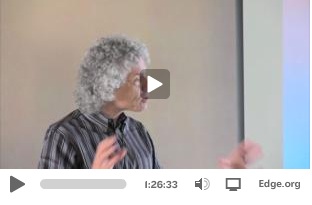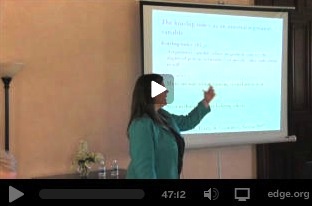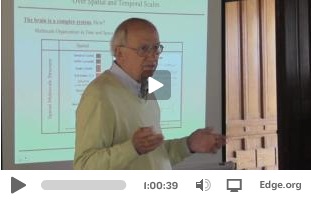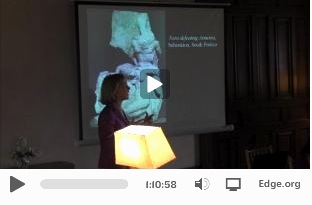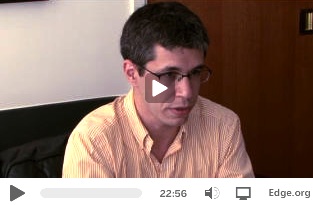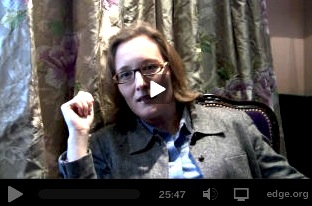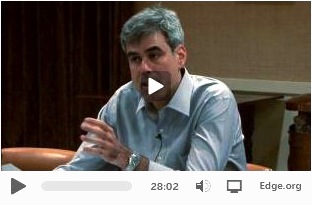
"EDGE'S LONG-FORM INTERVIEW VIDEOS ARE A DEEP DIVE INTO THE DAILY LIVES AND PASSIONS OF ITS SUBJECTS"
For those seeking substance over sheen, the occasional videos released at Edge.org hit the mark. The Edge Foundation community is a circle, mainly scientists but also other academics, entrepreneurs, and cultural figures. ... Edge's long-form interview videos are a deep-dive into the daily lives and passions of its subjects, and their passions are presented without primers or apologies. The decidedly noncommercial nature of Edge's offerings, and the egghead imprimatur of the Edge community, lend its videos a refreshing air, making one wonder if broadcast television will ever offer half the off-kilter sparkle of their salon chatter.
|
EDGE CONVERSATION
ADVENTURES IN BEHAVIORAL NEUROLOGY—OR—WHAT NEUROLOGY CAN TELL US ABOUT HUMAN NATURE Neuroscientist; Professor & Director, Center for Brain and Cognition, UC, San Diego; Author, The Tell-Tale Brain So here is something staring you in the face, anextraordinary syndrome, utterly mysterious, where a person wants his normal limb removed. Why does this happen? There are all kinds of crazy theories about it including Freudian theories. One theory asserts, for example, that it's an attention seeking behavior. This chap wants attention so he asks you to remove his arm. It doesn't make any sense.Why does he not want his nose removed or ear removed or something less drastic? Why an arm. |
|||
|
|
|||
|
|||
|
|
|||
|
EDGE CONVERSATION
INFINITE STUPIDITY Professor of Evolutionary Biology, Reading University, England and The Santa Fe Institute; Author, Wired for Culture A tiny number of ideas can go a long way, as we've seen. And the Internet makes that more and more likely. What's happening is that we might, in fact, be at a time in our history where we're being domesticated by these great big societal things, such as Facebook and the Internet. We're being domesticated by them, because fewer and fewer and fewer of us have to be innovators to get by. And so, in the cold calculus of evolution by natural selection, at no greater time in history than ever before, copiers are probably doing better than innovators. |
|||
|
|
|||
|
EDGE CONVERSATION
THINKING ABOUT THE UNIVERSE ON THE LARGER SCALES Professor of Theoretical Physics, Berkeley
|
|||
|
|
|||
|
EDGE CONVERSATION
A ROUGH MIX: BRIAN ENO & JENNIFER JACQUET
ENO: Artist; Composer; Recording Producer: U2, Coldplay, Talking Heads, Paul Simon; Recording Artist, Small Craft on a Milk Sea JACQUET: Postdoctoral Researcher, Fisheries Centre/Department of Mathematics, University of British Columbia, researching cooperation and the tragedy of the commons
ENO: Usually one is asked to do music for films but this is for a totem pole. JACQUET: Throughout the 19th century, native tribes that spanned the north coast of North America erected shame totem poles to signal to the community that certain individuals or groups had transgressed.
|
|||
|
|
|||
|
Googleplex, Mountain View, California — August 12-14, 2011
|
|||
|
|
|||
|
EDGE CONVERSATION
THE LOCAL-GLOBAL FLIP, OR, "THE LANIER EFFECT" Computer scientist; musician; author, You Are Not A Gadget
|
|||
|
|
|||
|
EDGE CONVERSATION
ON THE SCIENCE OF COOKING CEO and Managing Director, Intellectual Ventures; Co-Author (with Bill Gates), The Road Ahead; Author, Modernist Cuisine Cooking also obeys the laws of physics, in particular chemistry. Yet it is quite possible to cook without understanding it. You can cook better if you do understand what is going on, particularly if you want to deviate from the ways that people have cooked before. If you want to follow a recipe exactly, slavishly, what the hell, you can do it without understanding it. As a rote automaton, you can say, "yes, I mixed this, I cook at this temperature" and so forth. But if you want to do something really different, if you want to go color outside the lines, if you want to go outside of the recipe, it helps if you have some intuition as to how things work. |
|||
|
|
|||
|
EDGE MASTER CLASS
THE MARVELS AND THE FLOWS OF INTUITIVE THINKING Eugene Higgins Emeritus Professor of Psychology; Nobel Laureate; Author, Thinking Fast and Slow
|
|||
|
|
|||
|
EDGE MASTER CLASS
THE EVOLUTION OF COOPERATION Professor of Biology and Mathematics, Harvard University; coathor, SuperCooperators
|
|||
|
|
|||
|
EDGE MASTER CLASS
A HISTORY OF VIOLENCE Johnstone Family Professor, Department of Psychology; Harvard University; Author, The Better Angles of Our Nature
|
|||
|
|
|||
|
EDGE MATSER CLASS
THE ARCHITECTURE OF MOTIVATION Professor of Psychology at UCSB Recent research concerning the welfare of others, etc. affects not only how to think about certain emotions, but also overturns how most models of reciprocity and exchange, with implications about how people think about modern markets, political systems, and societies. What are these new approaches to human motivation?
|
|||
|
|
|||
|
EDGE MASTER CLASS
NEUROSCIENCE AND JUSTICE Neuroscientist, UC Santa Barbara; Author, Who's In Charge
|
|||
|
|
|||
|
|||
|
|
|||
|
EDGE CONVERSATION
INSIGHT Cognitive Psychologist; Author, Sources of Power; Streetlights and Shadows: Searching for Keys to Adaptive Decision Making Judgments based on intuition seem mysterious because intuition doesn't involve explicit knowledge. It doesn't involve declarative knowledge about facts. Therefore, we can't explicitly trace the origins of our intuitive judgments. They come from other parts of our knowing. They come from our tacit knowledge and so they feel magical. Intuitions sometimes feel like we have ESP, but it isn't magical, it's really a consequence of the experience we've built up. |
|||
|
|
|||
|
EDGE CONVERSATION
WHY CITIES KEEP GROWING, CORPORATIONS AND PEOPLE ALWAYS DIE, AND LIFE GETS FASTER Distinguished Professor and Past President, Santa Fe Institute The question is, as a scientist, can we take these ideas and do what we did in biology, at least based on networks and other ideas, and put this into a quantitative, mathematizable, predictive theory, so that we can understand the birth and death of companies, how that stimulates the economy? —Geoffrey West |
|||
|
|
|||
|
EDGE CONVERSATION
THE SOCIAL PSYCHOLOGICAL NARRATIVE—OR—WHAT IS SOCIAL OSYCHOLOGY, ANYWAY? Sherrell J. Aston Professor of Psychology at the University of Virginia; Co-author, Social Psychology; Author, Strangers to Ourselves; Redirect
|
|||
|
|
|||
|
EDGE CONVERSATION
THE ARGUMENTATIVE THEORY |
|||
|
|
|
|
EDGE CONVERSATION
WHO IS THE GREATEST BIOLOGIST OF ALL TIME? Professor of Evolutionary Developmental Biology, Imperial College; Author, Mutants
|
|
EDGE CONVERSATION
A SENSE OF CLEANLINESS Director, Cambridge Embodied Cognition and Emotion Laboratory; University Lecturer, Department of Social and Developmental Psychology Cambridge As far as morality goes, disgust has received a lot of attention, and there has been a lot of work on it. The flip side of it is cleanliness, or being tidy, proper, clean, pure, which has been considered the absence of disgust, or contamination. But there is actually more to being clean, and having things in order. On some level even cleanliness, or the desire to feel clean and pure has a social origin in the sens that primates show social grooming: Monkeys tend to get really close to each other, they pick insects off each other's fur, and it's not just useful in terms of keeping themselves clean, but it has an important social function in terms of bonding them together |
|
|
|
|
|
EDGE@DLD: AN EDGE CONVERSATION IN MUNICH
BACK TO ANALOG Science Historian; Author, Turing's Cathedral: The Origins of the Digital Universe; Darwin Among the Machines Where is this whole digital world going? And I'm going to risk being thrown out of here by saying... not that digital is over, but that we've already moved into a new phase, that people just are not recognizing yet: back to analog. We're taking that cathode ray tube back the other way. |
|
|
|
|
|
EDGE SEMINAR
THE NEW SCIENCE OF MORALITY Professor of Social Psychology, University of Virginia; Author, The Righteous Mind I'm all in favor of reductionism, as long as it's paired with emergentism. You've got to be able to go down to the low level, but then also up to the level of institutions and cultural traditions and, all kinds of local factors. A dictum of cultural psychology is that "culture and psyche make each other up." We psychologists are specialists in the psyche. What are the gears turning in the mind? But those gears turn, and they evolved to turn, in various ecological and economic contexts. |
|
EDGE SEMINAR
THE NEW SCIENCE OF MORALITY, PART 2 Cognitive Neuroscientist and Philosopher, Harvard University
|
||
|
|
||
|
EDGE SEMINAR
A NEW SCIENCE OF MORALITY Neuroscientist; Chairman, The Reason Project; Author, Free Will Most scientists and public intellectuals, and I would guess, most journalists—have been convinced that something in the last 200 years of intel- lectual progress has made it impossible to actually speak about "moral truth." Not because human experience is so difficult to study or the brain too complex, but because there is thought to be no intellectual basis from which to say that anyone |
||
|
|
||
|
||



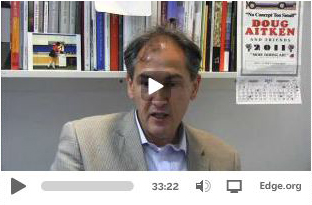
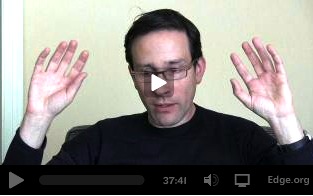

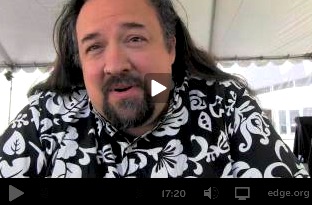
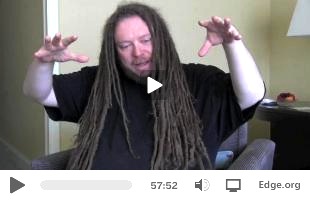
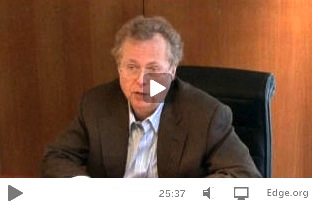
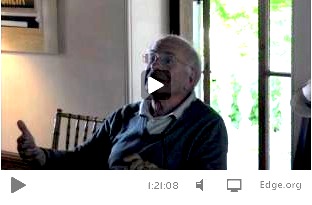
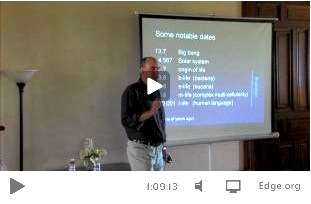 Why has cooperation, not competition, always been the key to the evolution of complexity?
Why has cooperation, not competition, always been the key to the evolution of complexity?